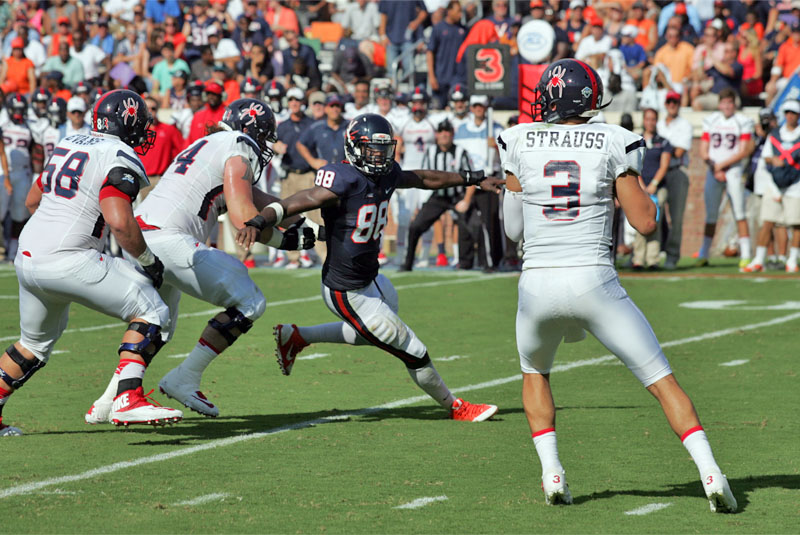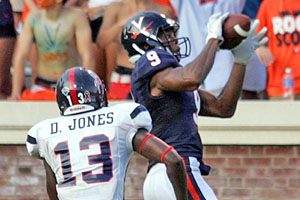
The losing streak is over and the ACC drought has ended. Virginia’s football team took care of both of those last week with a 23-21 win against Louisville in Charlottesville. Still, at 2-1 for the fifth time in the five-year Mike London era, there’s still plenty left to prove for this year’s Cavaliers.
For starters, can they win on the road? UVa hasn’t won away from home since a 33-6 victory at NC State on Nov. 3, 2012. The last non-conference road win came at Indiana on Sept. 10, 2011 in a 34-31 victory, though as a Power Five team there are limited opportunities for non-ACC road wins. Winning at No. 21 BYU won’t be easy. The Cougars have won at least eight games in all but two seasons under Bronco Mendenhall, who took over the program in 2005; Mendenhall has never had a losing record. Since 2003, BYU has 16 wins against Power Five schools.
Here’s everything you need to know for the contest.
Essentials
- Game Time: Saturday, Sept. 20, 3:30 p.m. (ET)
- Location: LaVell Edwards Stadium, Provo, Utah
- TV Info: ESPN
- Radio Info: WINA 1070AM
- Live Radio Feed: Cavaliers Live
- UVa TV/Radio Affiliates
- Live Game Tracker Stats
- LaVell Edwards Stadium Information
- Tailgating Info and Policies
- UVa Official Notes and Stats – printable pdf
- BYU Notes and Stats – printable pdf
- Projected Depth Chart – printable pdf
- UVa vs BYU Roster Card – printable pdf
- Exclusive Weather Updates
Game Nuggets
- Virginia owns a 3-1 edge in the all-time series with BYU, including last season’s 19-16 win in Charlottesville. This contest is the finale of a two-game contract. The first meeting occurred at the 1987 All American Bowl in Birmingham, Ala., a game UVa won 22-16. BYU’s only win in the series came on Sept. 2, 2000, the day of the expanded Scott Stadium dedication. The Cougars won that one 38-35.
- After last season’s 14-3 loss at Pitt, Virginia has lost seven of its last eight road openers. The Cavaliers are 43-76-3 all-time in road openers.
- The Hoos are playing west of the Mississippi River for only the 17th time in school history and they are 4-12 on their previous trips. The last win? The 45-40 victory against BYU in 1999.
- BYU coach Bronco Mendenhall is in his 10th season as head coach of the Cougars and he now owns a 88-34 record at the school.
- UVa is the only team in the nation to play three ranked schools from the Associated Press poll in the first four weeks. UCLA (then No. 7) won 28-20 on Aug. 30, while Louisville (then No. 21) fell 23-21 on Sept. 13. BYU is ranked No. 21 in this week’s poll.
Spotlight On Jamaal Williams
Quarterback Taysom Hill snares a lot of headlines at BYU thanks to a blend of running talents, scrambling ability, and passing skills. For the season, Hill has accounted for 689 yards and four touchdowns passing to go with 356 yards and six touchdowns rushing. All of that flashy production overshadows workhorse running back Jamaal Williams, though.
Williams has played two games this season for the Cougars and posted 228 rushing yards on 47 carries. That’s 114.0 yards per game and 4.9 yards per carry. He also has two catches for 21 yards. That pushed his career totals to 2,236 yards. That puts the junior in position to chase the record books at BYU if he stays for his senior season. The all-time leading rusher in program history is Harvey Unga, who had 3,455 yards in three years at BYU. Williams has been Mr. Reliable when it comes to turnovers – he has not lost a fumble in 402 career carries.
The Cavaliers saw up close what Williams could do last season. He carried the ball 33 times for 144 yards (4.4 yards per carry) in a rain-soaked game at Scott Stadium. Of course, some of that may have been by design – with BYU using the read option, the defense can make decisions to force the handoff to the running back. This season, however, that sort of strategy may not work entirely because the Cougars are calling more designed running plays for Hill.
Regardless, BYU is setting the tone with the run this season (159 carries compared to 67 pass attempts) so the Hoos will need a good effort against Williams on Saturday.
Match-Ups To Watch
BYU quarterback Taysom Hill vs. the Virginia front seven. This one has to be in here. Slow down Taysom Hill and you stop BYU. That’s all over the stats from last season. A 19-16 loss at Virginia: Hill 13-40 passing, 175 yards, one TD, one INT with 42 yards rushing and one TD. A 20-13 loss to Utah: Hill 18-48 passing, 260 yards, one INT with 99 yards rushing. A 27-17 loss to Wisconsin: Hill 19-41 passing, 207 yards, two TDs, one INT with 53 yards rushing. A 23-13 loss to Notre Dame: Hill 21-36 passing, 168 yards, one TD, one INT with 101 yards rushing. A 31-16 loss to Washington: Hill 25-48 passing, 293 yards, one INT with 133 yards and one TD rushing. In each of those defeats, Hill had inefficient days passing the football and was held somewhat in check running the football (either low yards or low touchdowns in all of them). There will be a lot of pressure from rushers Eli Harold and Max Valles so can tackles David Dean and Mike Moore team up with Henry Coley and Daquan Romero to bottle up Hill?

Virginia receivers Canaan Severin and Darius Jennings vs. BYU safety Craig Bills and the underneath coverage. The Cougars’ defense has been solid so far this season, but I think the Hoos’ present the most balanced attack yet on the schedule. Connecticut didn’t create a big passing threat, while Texas and Houston couldn’t really run the ball. UVa certainly isn’t a juggernaut by any stretch of the imagination, but the offense does have a variety of pieces to potentially keep BYU off guard. One area where the Cougars appear to be vulnerable is in the intermediate passing zones with crossing routes, dig routes, seam routes, and screen passes all potentially a threat. I think Virginia can get the ball to players like Severin and Jennings in those areas and both have potential to create yards after the catch. But beware! Bills is a fierce-hitting safety that roams that area so a floating pass or an unaware receiver can get blown up as Bills tries to set the tone for the defense. He had an interception in Charlottesville last season and he has recorded 16 tackles with one INT so far in 2014.
Virginia tackles Sadiq Olanrewaju, Michael Mooney, and Eric Smith vs. BYU linebacker Alani Fua. On obvious downs, Fua is tough on the edge. He has posted 15 tackles this season with three tackles for loss/two sacks in the mix. He also has a quarterback hurry and a pass breakup to his credit. He returned an interception for a touchdown against Georgia Tech last season. Fua resembles Max Valles (6’5″/234 vs. 6’5″/240) as a stand-up rusher in what becomes a 2-4-5 on long-distance downs, though he isn’t quite that quick I don’t think. Still, young tackles Olanrewaju (just back from injury), Mooney, and Smith could have their hands full with Fua. Virginia may decide to chip the edge rush in these scenarios with a tight end or running back, but keep an eye on Fua in this one.
Kris’ Keys
1. Keep generating turnovers. Virginia leads the nation in take-aways so far this season with 13 – only three other teams are in double figures (Temple, South Florida, and Houston each have 10). The Cavaliers have recovered eight fumbles and grabbed five interceptions. Simply put, a stout run defense (No. 17 nationally in yards per game) combined with a ferocious pass rush (tied for No. 8 nationally in sacks) is causing all kinds of trouble for opponents. That has led to 44 points off of turnovers for the Cavaliers, which is half of the team total. BYU appears to have some vulnerability here with seven turnovers this season, tied for 14th nationally in turnovers lost.
2. Press the edge. In some ways, the offensive game plan this week could be a carbon copy of last week’s outline against Louisville. That means using jet motion looks to loosen up the gut runs in the running game (often works whether you hand it to the motion guy or not), while mixing in some deep throws on the sidelines and into the intermediate zones. I do think that perimeter running plays along with well-timed receiver screens – I know, I know but I did say well-timed! – can go for big yards against the Cougars. Connecting on a few of those outside the numbers will open up everything else.
3. Make penalties pay. BYU is one of the most penalized teams in the country, entering this game ranked 124th nationally out of 128 teams. The Cougars give up 96.0 yards per game in penalties – that’s nearly the whole field each outing! This isn’t a one-year hiccup either. Over the last five years, BYU has an average ranking of 78th nationally while giving up an average of 56.4 yards per game in penalties. So far this season, Virginia has been good with penalties as it enters this weekend ranked 19th nationally at 35.0 yards per game. If the averages hold, that’s 60+ yards to swing in UVa’s favor. For a team built on defense, special teams, and field position, that can be a big boost … but the Hoos need to take advantage of the situations. If BYU ends up in second-and-long due to holding, don’t give up the first down. If BYU commits a holding penalty on defense, turn the drive into points. Do that and the Hoos have a chance.
The Pick
For the first time this season, I’m not sure what to do with the pick. I felt confident that UVa could keep it close against UCLA, but didn’t think the Hoos would be able to pull it off late. I felt certain that the Cavaliers were a lot better than Richmond over 60 minutes. I had a hunch that Louisville wasn’t the toughest match-up for Virginia and that it presented a very good opportunity to snap some streaks. I picked Wahoo wins in all three games and missed the score predictions by a total of 12 points (nine for UCLA, two for Richmond, and one for Louisville). In other words, I felt like I had a good handle on the opponents and Virginia’s chances.
This week? No idea. I picked BYU on Richmond radio but have waffled back and forth in my mind on it for this article. I do not think the Cougars have been tested yet and they certainly haven’t seen a defense like Virginia’s group. I do not think the BYU offense is unstoppable or other-worldly scary like say a Clemson or Oregon last season. Still, the Cougars win consistently and they are tough at home. Plus, it is the first road test for Greyson Lambert as a starter and for a developing offensive line …
Virginia can win if … it tackles well. BYU doesn’t score on explosive plays too often, but it does move the ball in chunks – 17th nationally in plays of 10-20 yards with 56 such plays. The Cougars’ longest passing play this season is 38 yards and that play ended with a fumble. The longest running play is 31 yards. In other words, BYU plays fast and eats up yards without hitting a home run. If a defense can tackle to shorten some of those gains and make a few plays to put the Cougars behind the chains, it can slow down this offense. That requires good discipline and good tackling, particularly on Taysom Hill running plays.
Virginia can lose if … it starts slowly. Playing on the road for the first time this season in high altitude, UVa doesn’t want to get behind and have to play catch-up in this game. That’s a tall order in this atmosphere. Besides, BYU is very, very good when it takes the lead first. In the Bronco Mendenhall era, the Cougars are 64-8 and when scoring first, which includes a nine-game winning streak. Last season, BYU finished 6-1 when scoring first. The loss? At Virginia.
And the winner is … undecided? What, I can’t do that? OK fine. I actually think Virginia is the better team, but I can’t shake the first road game/young quarterback factor. I am 95% certain that the Hoos will beat the Vegas spread hovering between 14 and 16 points because, simply put, BYU just isn’t that much better than UVa. Can the Hoos pull out the win, though? I picked BYU on Richmond radio in a close one, but I’m going to flip flop here. Turnovers tell the tale and the Cougars are more vulnerable there than the Cavaliers. Virginia 27, BYU 24. Prediction record to date: 3-0.



